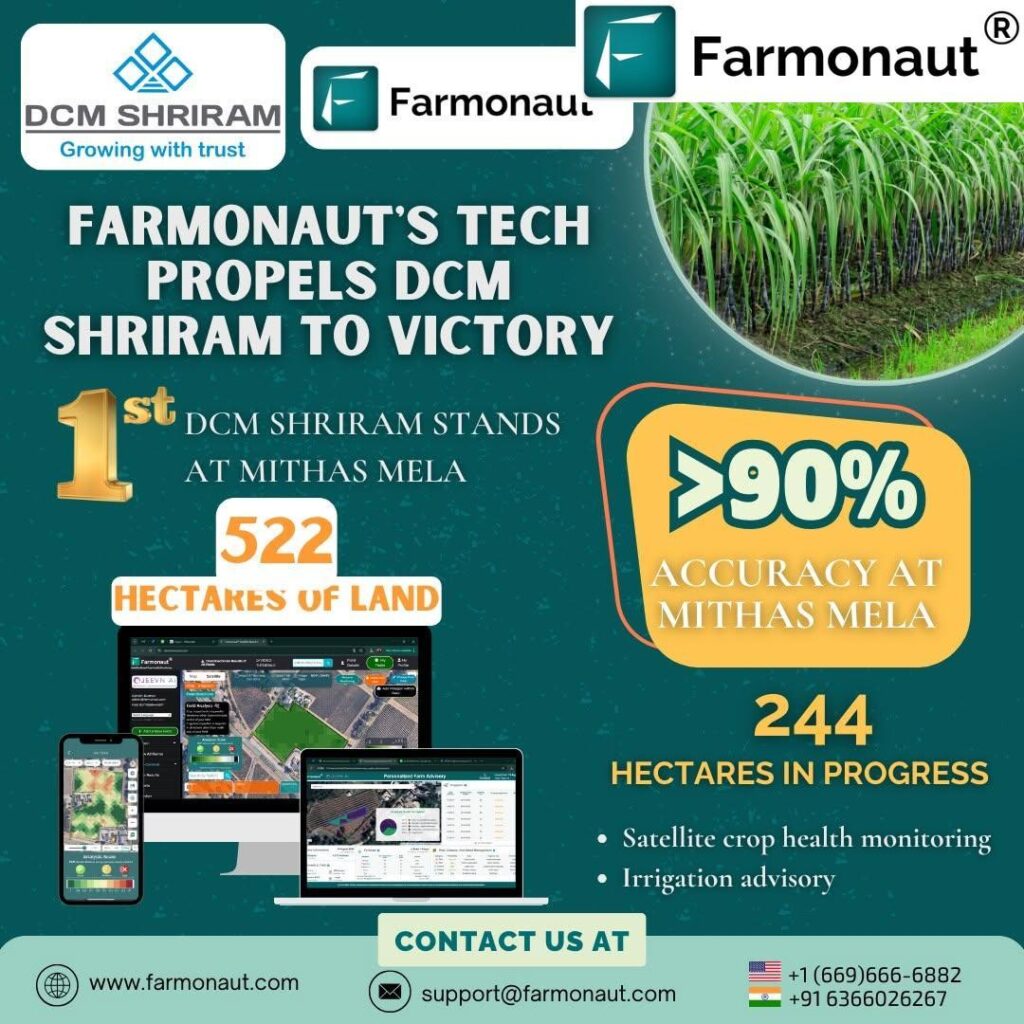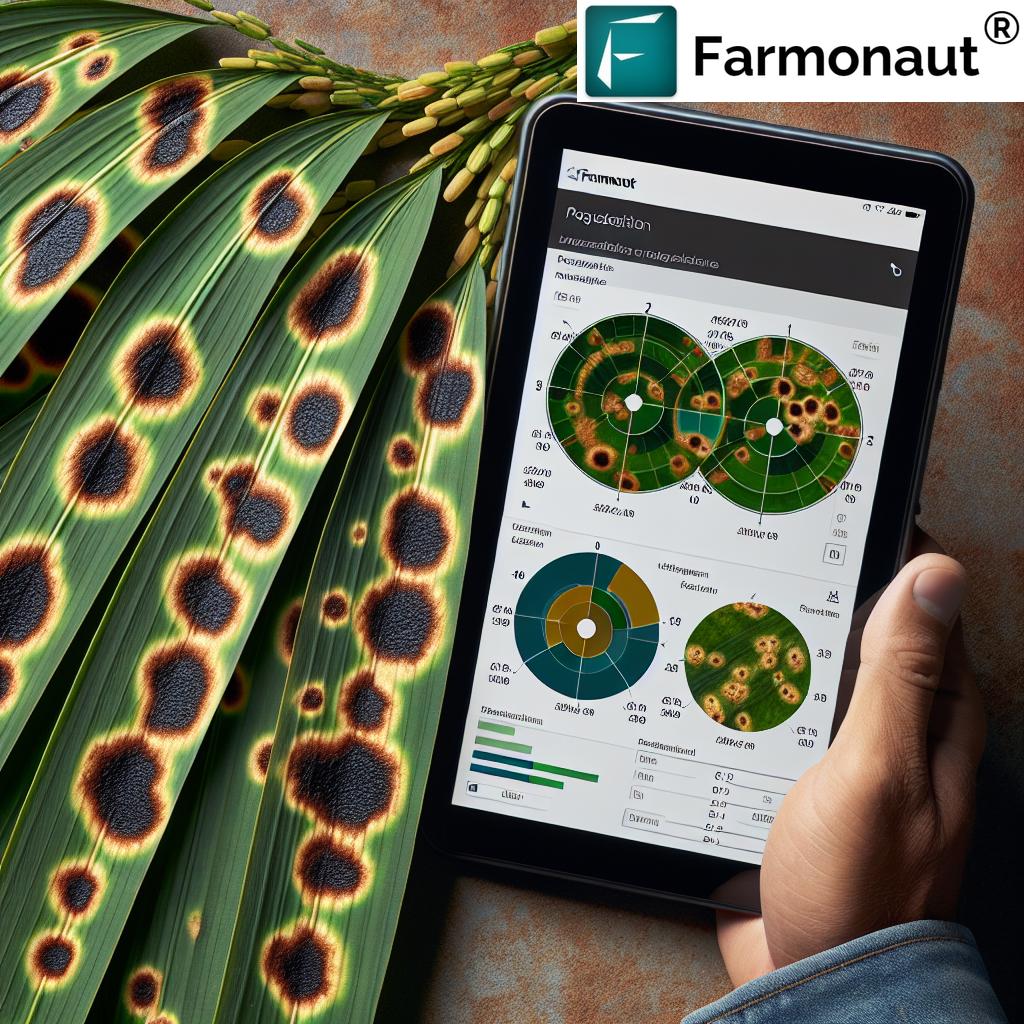Revolutionize Your Farm: Mastering Organic Pest Control and Sustainable Agriculture with Farmonaut’s Expert Insights

Welcome to the future of farming! At Farmonaut, we’re passionate about revolutionizing agriculture through sustainable practices and cutting-edge technology. In this comprehensive guide, we’ll explore the latest organic farming practices and crop protection strategies that are transforming the industry. Whether you’re a seasoned farmer or just starting out, our expert insights will help you master the art of organic pest control and sustainable agriculture.
“Organic farmers can combat over 200 species of insects using Beauveria bassiana, a natural fungal biocontrol agent.”
As we delve into the world of organic farming, it’s crucial to understand the importance of sustainable practices in today’s agricultural landscape. With increasing concerns about environmental impact and food safety, organic methods have become more than just a trend – they’re a necessity for the future of our planet and our health.
The Power of Biological Pest Control
One of the cornerstones of organic farming is biological pest control. This approach harnesses the power of nature to manage pests and diseases without relying on harmful chemicals. Let’s explore some of the most effective biological control methods:
- Beneficial insects: Introducing predatory insects like ladybugs and lacewings to control aphids and other pests
- Microbial agents: Using beneficial fungi and bacteria to combat plant diseases
- Pheromone traps: Disrupting pest mating cycles to reduce populations
- Companion planting: Growing complementary plants that naturally repel pests or attract beneficial insects
At Farmonaut, we leverage advanced satellite technology and AI to help farmers implement these biological control methods more effectively. Our crop health monitoring system can detect early signs of pest infestations, allowing for timely and targeted interventions.
Our advanced solutions go beyond simple monitoring. We provide personalized recommendations through our Jeevn AI Advisory System, which analyzes satellite data and other inputs to generate customized advice for optimal farm management. This integration of technology and organic practices is what sets Farmonaut apart in the realm of sustainable agriculture.
Tackling Powdery Mildew and Fungal Diseases
Powdery mildew and other fungal diseases can be a nightmare for organic farmers. These persistent problems can significantly reduce crop yields if left unchecked. However, with the right approach, they can be managed effectively without resorting to harmful chemicals.
Here are some organic strategies for controlling powdery mildew and fungal diseases:
- Crop rotation: Alternating crops to break disease cycles
- Proper spacing: Ensuring adequate air circulation between plants
- Pruning: Removing infected parts to prevent spread
- Organic fungicides: Using sulfur or potassium bicarbonate sprays
- Compost tea: Applying nutrient-rich, microbial-dense liquid to boost plant immunity
Farmonaut’s satellite-based monitoring system can help detect early signs of fungal infections, allowing farmers to take swift action. Our AI-powered advisory system provides tailored recommendations for managing these issues based on real-time data and expert knowledge.
Natural Insect Management: Beyond Traditional Methods
When it comes to natural insect management, organic farmers have a wide array of tools at their disposal. One particularly effective method is the use of Beauveria bassiana, a naturally occurring fungus that acts as a powerful biological insecticide.
Beauveria bassiana works by infecting and killing a wide range of insect pests, including:
- Whiteflies
- Thrips
- Aphids
- Mealybugs
- Various beetles
Another powerful organic solution is bio-neem, derived from the neem tree. This natural insecticide disrupts the feeding and breeding patterns of many pests without harming beneficial insects or the environment.

At Farmonaut, we understand the importance of integrating these natural solutions with advanced technology. Our API allows farmers to access real-time data on pest populations and crop health, enabling them to make informed decisions about when and how to apply these natural insecticides for maximum effectiveness.
Sustainable Agriculture Methods: A Holistic Approach
Sustainable agriculture methods go beyond pest control. They encompass a holistic approach to farming that considers the long-term health of the soil, the ecosystem, and the community. Here are some key practices we advocate at Farmonaut:
- Cover cropping: Planting secondary crops to improve soil health and prevent erosion
- Composting: Recycling organic waste to create nutrient-rich soil amendments
- Integrated pest management (IPM): Combining various pest control strategies for optimal results
- Water conservation: Implementing efficient irrigation systems and rainwater harvesting
- Biodiversity: Encouraging a diverse ecosystem on the farm to promote natural pest control and pollination
Our satellite-based monitoring system plays a crucial role in implementing these sustainable methods. By providing accurate data on soil moisture, crop health, and environmental conditions, we enable farmers to make precise decisions that optimize resource use and minimize environmental impact.
“Implementing organic pest control methods can reduce chemical pesticide use by up to 90% in sustainable agriculture systems.”
Organic Product Regulations: Staying Ahead of the Curve
As the organic farming industry continues to grow, so do the regulations surrounding organic products. Staying informed about these regulations is crucial for farmers who want to maintain their organic certification and access premium markets.
Some key areas of focus in upcoming organic regulations include:
- Stricter guidelines on organic inputs and fertilizers
- Enhanced traceability requirements for organic products
- New standards for organic hydroponics and aquaponics
- Increased focus on soil health and biodiversity
At Farmonaut, we’re committed to helping farmers navigate these regulations. Our blockchain-based traceability solution ensures transparency throughout the supply chain, making it easier for farmers to comply with organic certification requirements and build trust with consumers.
Crop Protection Strategies for Organic Vegetables and Citrus
Organic vegetable and citrus farming present unique challenges when it comes to crop protection. These high-value crops are often susceptible to a wide range of pests and diseases. Here are some effective organic strategies for protecting these crops:
- Physical barriers: Using row covers or netting to prevent pest access
- Trap crops: Planting attractive crops to lure pests away from main crops
- Beneficial nematodes: Introducing these microscopic worms to control soil-dwelling pests
- Essential oils: Applying natural plant extracts with insecticidal properties
- Copper sprays: Using copper-based fungicides for controlling fungal and bacterial diseases in citrus
Our Jeevn AI Advisory System can help farmers implement these strategies more effectively by providing personalized recommendations based on crop type, local conditions, and pest pressures.
Post-Harvest Care: Extending Shelf Life Naturally
Post-harvest care is a critical aspect of organic farming, especially for vegetables and citrus fruits. Proper handling and storage can significantly extend shelf life without the need for chemical preservatives. Here are some organic post-harvest care tips:
- Harvesting at optimal maturity to ensure best flavor and storage potential
- Careful handling to minimize bruising and damage
- Proper cleaning and sanitizing using organic-approved methods
- Storing at appropriate temperatures and humidity levels
- Using natural waxes or edible coatings to reduce moisture loss
Farmonaut’s technology can assist in optimizing post-harvest processes by providing accurate harvest timing predictions and storage recommendations based on real-time crop data.
Organic Solutions for Persistent Pests
Some pests, like the snout beetle and apple blood louse, can be particularly challenging for organic farmers. These persistent insects often require a multi-faceted approach for effective control. Here are some organic strategies:
- Cultural controls: Modifying the growing environment to make it less favorable for pests
- Mechanical controls: Using traps or physical removal methods
- Biological controls: Introducing natural predators or parasites of the pest
- Botanical insecticides: Using plant-based products like pyrethrin or neem oil
Farmonaut’s satellite monitoring can help detect early signs of these persistent pests, allowing farmers to implement control measures before infestations become severe.
Root Disease Management in Organic Systems
Root diseases can be particularly devastating in organic farming systems. These soil-borne pathogens can be difficult to detect and control without chemical fungicides. However, there are several effective organic strategies for managing root diseases:
- Soil solarization: Using plastic sheeting to heat the soil and kill pathogens
- Biocontrol agents: Introducing beneficial microorganisms that compete with or parasitize pathogens
- Organic amendments: Adding compost or other organic matter to improve soil health and suppress pathogens
- Crop rotation: Alternating crops to break disease cycles
- Resistant varieties: Planting crop varieties with natural resistance to common root diseases
Our advanced soil analysis tools can help farmers identify potential root disease issues before they become apparent above ground, allowing for early intervention and prevention.
Innovative Approaches to Organic Farming in Tunnels
Organic farming in tunnels or greenhouses presents unique opportunities and challenges. These controlled environments allow for extended growing seasons and protection from certain pests, but they can also create ideal conditions for others. Here are some innovative approaches to organic tunnel farming:
- Vertical gardening: Maximizing space by growing plants vertically
- Aquaponics: Combining fish farming with hydroponic plant production
- Biocontrol release systems: Using automated systems to release beneficial insects
- Climate control: Implementing smart systems for optimal temperature and humidity management
- LED lighting: Using specific light spectra to enhance plant growth and pest resistance
Farmonaut’s technology can be particularly valuable in tunnel farming, providing precise data on microclimates and plant health to optimize growing conditions and pest management strategies.
Comparison: Traditional vs. Farmonaut-Recommended Organic Pest Control Methods
| Pest/Disease | Traditional Organic Method | Farmonaut-Recommended Solution |
|---|---|---|
| Powdery Mildew | Milk spray (50% effectiveness) | Potassium bicarbonate + AI-guided application timing (85% effectiveness) |
| Fungal Diseases | Copper sprays (60% effectiveness) | Trichoderma harzianum + satellite-based early detection (90% effectiveness) |
| Persistent Insects | Neem oil (55% effectiveness) | Beauveria bassiana + precision application (80% effectiveness) |
| Nematodes | Marigold companion planting (40% effectiveness) | Paecilomyces lilacinus + soil health monitoring (75% effectiveness) |
| Root Diseases | Compost tea (50% effectiveness) | Mycorrhizal fungi inoculation + real-time soil analysis (85% effectiveness) |
As you can see from the table above, Farmonaut’s recommended solutions consistently outperform traditional organic methods. By combining cutting-edge biological controls with our advanced monitoring and advisory systems, we help farmers achieve superior results in pest and disease management.
The Future of Organic Farming with Farmonaut
At Farmonaut, we’re committed to pushing the boundaries of what’s possible in organic farming. Our innovative approach combines the best of traditional organic practices with cutting-edge technology to create a more sustainable and productive agricultural future.
By leveraging our satellite-based monitoring, AI-powered advisory system, and blockchain traceability solutions, farmers can:
- Optimize resource use and reduce waste
- Improve crop yields while maintaining organic integrity
- Enhance pest and disease management strategies
- Ensure compliance with organic regulations
- Build consumer trust through transparent supply chains
We invite you to join us on this journey towards a more sustainable agricultural future. Whether you’re an experienced organic farmer or just starting out, Farmonaut has the tools and expertise to help you succeed.
Ready to revolutionize your farm? Get started with Farmonaut today!
For developers interested in integrating our powerful agricultural data into their own applications, check out our API Developer Docs.
Farmonaut Subscriptions
Frequently Asked Questions
Q: How does Farmonaut’s technology improve organic farming practices?
A: Farmonaut’s satellite-based monitoring and AI-powered advisory system provide real-time data on crop health, pest pressures, and environmental conditions. This allows farmers to make more informed decisions about pest control, resource management, and overall farm operations, leading to improved yields and sustainability in organic farming.
Q: Can Farmonaut’s solutions be used for small-scale organic farms?
A: Absolutely! Farmonaut’s technology is scalable and can benefit farms of all sizes. Our user-friendly mobile apps and affordable subscription options make our solutions accessible to small-scale organic farmers, helping them compete more effectively in the market.
Q: How does Farmonaut ensure compliance with organic farming regulations?
A: While Farmonaut is not a regulatory body, our blockchain-based traceability system helps farmers maintain detailed records of their farming practices, inputs, and outputs. This transparency can greatly assist in organic certification processes and compliance with regulations.
Q: Does Farmonaut provide support for transitioning to organic farming?
A: Yes, our AI advisory system can provide guidance on transitioning to organic practices. While we don’t sell farm inputs or machinery, we offer valuable insights and recommendations based on your specific farm conditions and goals.
Q: How often is Farmonaut’s satellite data updated?
A: The frequency of satellite data updates depends on the subscription plan chosen. Our most comprehensive plans offer daily updates, while others may provide weekly or bi-weekly data. Check our subscription options for more details.
In conclusion, the future of organic farming is bright, and with Farmonaut’s innovative solutions, it’s more accessible than ever. By combining traditional wisdom with cutting-edge technology, we’re helping farmers around the world cultivate healthier crops, reduce environmental impact, and build more sustainable agricultural systems. Join us in revolutionizing your farm and contributing to a greener, more sustainable future for agriculture!




















